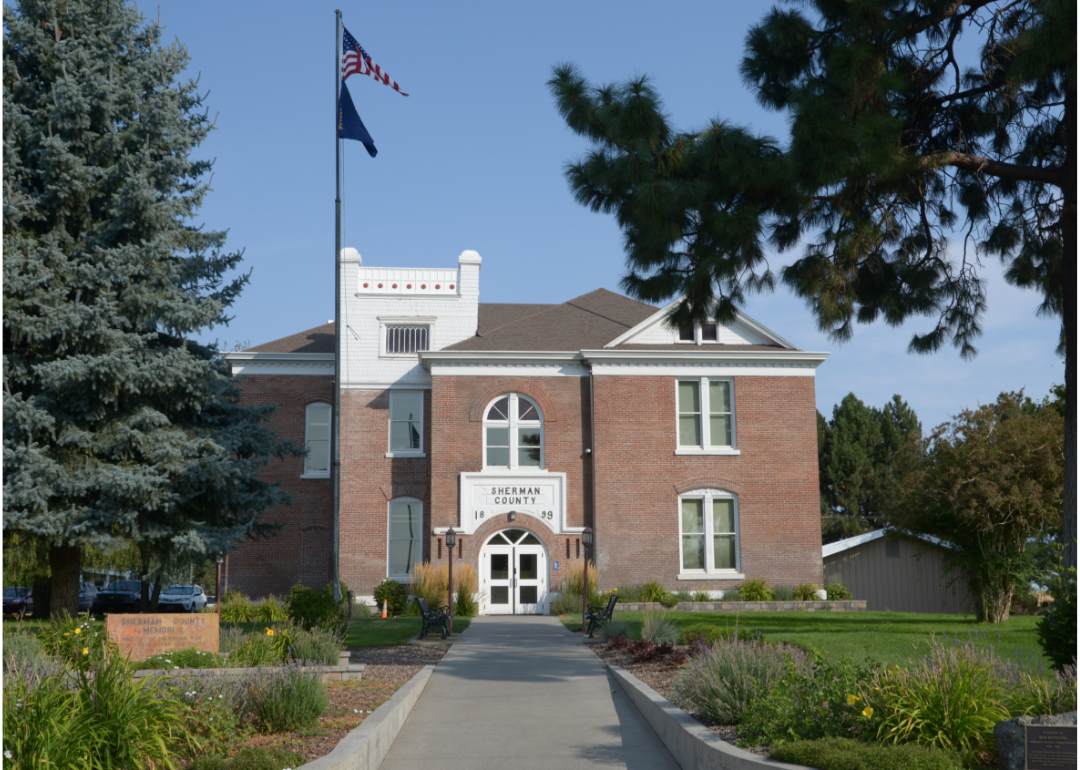Counties where the most opioids are dispensed in Oregon

Canva
Counties where the most opioids are dispensed in Oregon
When Purdue Pharma first began sales of OxyContin in the late 1990s, it was advertised as relief for cancer patients and people with chronic pain. Aggressive marketing fueled the drug’s popularity, along with that of other opioid pain management drugs on the market. But as the company touted OxyContin to physicians, it downplayed the drug’s addictiveness, according to confidential Justice Department reports obtained by news organizations, leading to widespread use that has fueled an opioid epidemic across the U.S.
More than 645,000 people have died from opioid-related overdoses between 1999 and 2021, according to the Centers for Disease Control and Prevention. Provisional data shows just under 80,000 people died in 2022 alone.
Opioid prescriptions have decreased dramatically over the past decade as physicians and public health officials learned about the dangers of OxyContin and other opioids prescribed for pain management. In 2020, the most recent year with data available, the national opioid dispense rate reached 43.3 per 100 people, the lowest rate ever recorded.
A 2022 study funded by the National Institute on Drug Abuse found that counties with higher dispensing rates had more cases of opioid misuse and dependence. The study suggested that reducing prescriptions at the local level can lower a community’s rate of opioid abuse or misuse.
Other studies, however, have suggested that decreasing prescriptions may have fueled a new phase of the opioid epidemic: the rise of synthetics like fentanyl. In 2020, synthetics accounted for 82% of all opioid deaths.
It’s also important to note that, as awareness has grown about the dangers of dispensing opioid prescription painkillers, more health care professionals are also prescribing medications like Suboxone–which contains buprenorphine and naloxone—for the treatment of addiction and opioid use disorders. While Suboxone is also an opioid medication, it works differently than typical opioid painkillers, blocking the effects of more powerful and addictive opioids to deter intentional misuse.
Using data from the Centers for Disease Control and Prevention, Ophelia broke down counties in every state with the highest opioid dispense rates. In the case of a tie, the county with the higher population and higher raw number is ranked higher. Data was available for 98% of counties in the United States. Overall in Oregon, the opioid dispensing rate was 45.6 per 100 people, compared to 43.3 nationally.
Read the national story for additional historical context and see where other counties outside of Oregon stand.
![]()

Canva
#36. Sherman County
– Opioid dispensing rate: 5.1 per 100 people
— 88.8% lower than state average
— 88.2% lower than national average

Bob Pool // Shutterstock
#35. Morrow County
– Opioid dispensing rate: 16.9 per 100 people
— 62.9% lower than state average
— 61.0% lower than national average

Cynthia Liang // Shutterstock
#34. Polk County
– Opioid dispensing rate: 20.9 per 100 people
— 54.2% lower than state average
— 51.7% lower than national average

Arpad Jasko // Shutterstock
#33. Gilliam County
– Opioid dispensing rate: 22.5 per 100 people
— 50.7% lower than state average
— 48.0% lower than national average

Canva
#32. Jefferson County
– Opioid dispensing rate: 23.7 per 100 people
— 48.0% lower than state average
— 45.3% lower than national average

kenneth korb // Shutterstock
#31. Columbia County
– Opioid dispensing rate: 24.7 per 100 people
— 45.8% lower than state average
— 43.0% lower than national average

Canva
#30. Linn County
– Opioid dispensing rate: 30.4 per 100 people
— 33.3% lower than state average
— 29.8% lower than national average

Canva
#29. Clackamas County
– Opioid dispensing rate: 31.0 per 100 people
— 32.0% lower than state average
— 28.4% lower than national average

Canva
#28. Yamhill County
– Opioid dispensing rate: 31.3 per 100 people
— 31.4% lower than state average
— 27.7% lower than national average

Bob Pool // Shutterstock
#27. Umatilla County
– Opioid dispensing rate: 31.5 per 100 people
— 30.9% lower than state average
— 27.3% lower than national average

Yanqiang Dai // Shutterstock
#26. Washington County
– Opioid dispensing rate: 35.2 per 100 people
— 22.8% lower than state average
— 18.7% lower than national average

Dee Browning // Shutterstock
#25. Grant County
– Opioid dispensing rate: 35.9 per 100 people
— 21.3% lower than state average
— 17.1% lower than national average

Canva
#24. Crook County
– Opioid dispensing rate: 35.9 per 100 people
— 21.3% lower than state average
— 17.1% lower than national average

Canva
#23. Marion County
– Opioid dispensing rate: 37.9 per 100 people
— 16.9% lower than state average
— 12.5% lower than national average

Canva
#22. Lincoln County
– Opioid dispensing rate: 38.1 per 100 people
— 16.4% lower than state average
— 12.0% lower than national average

Canva
#21. Klamath County
– Opioid dispensing rate: 39.7 per 100 people
— 12.9% lower than state average
— 8.3% lower than national average

Dominic Gentilcore PhD // Shutterstock
#20. Lake County
– Opioid dispensing rate: 44.4 per 100 people
— 2.6% lower than state average
— 2.5% higher than national average

Canva
#19. Harney County
– Opioid dispensing rate: 46.4 per 100 people
— 1.8% higher than state average
— 7.2% higher than national average

Bob Pool // Shutterstock
#18. Josephine County
– Opioid dispensing rate: 47.1 per 100 people
— 3.3% higher than state average
— 8.8% higher than national average

Josemaria Toscano // Shutterstock
#17. Multnomah County
– Opioid dispensing rate: 47.6 per 100 people
— 4.4% higher than state average
— 9.9% higher than national average

Canva
#16. Union County
– Opioid dispensing rate: 50.2 per 100 people
— 10.1% higher than state average
— 15.9% higher than national average

Tomas Nevesely // Shutterstock
#15. Wheeler County
– Opioid dispensing rate: 50.9 per 100 people
— 11.6% higher than state average
— 17.6% higher than national average

Canva
#14. Wallowa County
– Opioid dispensing rate: 51.3 per 100 people
— 12.5% higher than state average
— 18.5% higher than national average

Canva
#13. Wasco County
– Opioid dispensing rate: 51.3 per 100 people
— 12.5% higher than state average
— 18.5% higher than national average

Canva
#12. Clatsop County
– Opioid dispensing rate: 52.6 per 100 people
— 15.4% higher than state average
— 21.5% higher than national average

Canva
#11. Deschutes County
– Opioid dispensing rate: 53.1 per 100 people
— 16.4% higher than state average
— 22.6% higher than national average

Canva
#10. Douglas County
– Opioid dispensing rate: 53.8 per 100 people
— 18.0% higher than state average
— 24.2% higher than national average
cpaulfell // Shutterstock
#9. Benton County
– Opioid dispensing rate: 56.0 per 100 people
— 22.8% higher than state average
— 29.3% higher than national average

Canva
#8. Tillamook County
– Opioid dispensing rate: 59.1 per 100 people
— 29.6% higher than state average
— 36.5% higher than national average

Canva
#7. Lane County
– Opioid dispensing rate: 61.2 per 100 people
— 34.2% higher than state average
— 41.3% higher than national average

Canva
#6. Baker County
– Opioid dispensing rate: 68.4 per 100 people
— 50.0% higher than state average
— 58.0% higher than national average

Canva
#5. Coos County
– Opioid dispensing rate: 71.7 per 100 people
— 57.2% higher than state average
— 65.6% higher than national average

Canva
#4. Hood River County
– Opioid dispensing rate: 72.4 per 100 people
— 58.8% higher than state average
— 67.2% higher than national average

Canva
#3. Jackson County
– Opioid dispensing rate: 82.8 per 100 people
— 81.6% higher than state average
— 91.2% higher than national average

Manuela Durson // Shutterstock
#2. Curry County
– Opioid dispensing rate: 83.2 per 100 people
— 82.5% higher than state average
— 92.1% higher than national average

Hugh K Telleria // Shutterstock
#1. Malheur County
– Opioid dispensing rate: 84.4 per 100 people
— 85.1% higher than state average
— 94.9% higher than national average
This story originally appeared on Ophelia and was produced and
distributed in partnership with Stacker Studio.
